DEEP BLUE
Cape’s missing great white shark mystery solved, with implications for cross-border conservation
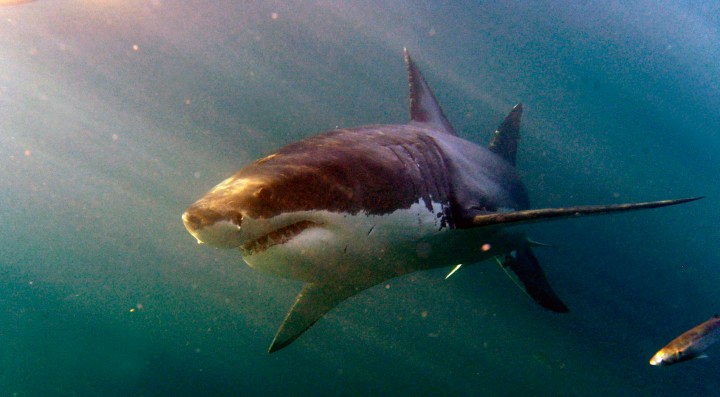
When two orcas arrived in False Bay, Cape Town, great white shark sightings dropped dramatically. Eight years later, the sharks still haven’t returned.
A whodunnit has been playing out in False Bay on the Cape Peninsula for nearly a decade, and the mystery might finally be solved. Like a round of marine Cluedo, the evidence points to the most likely culprits behind the bay’s missing great white sharks: the killer whale pair, Port and Starboard, who earned their nautical nicknames because of their distinctive left- and right-lilting dorsal fins.
The two became regular visitors to the bay in 2015 and, almost overnight, the white sharks vanished along with their dramatic seal-hunting aerial manoeuvres that have been freeze-framed for the world’s pleasure by so many photographers.
Some simple number-crunching of shark data spanning half a century confirms the many eyewitness accounts that put these two orcas in the crosshairs as investigators tried to explain the sharks’ sudden disappearance from this sheltered nook of the Atlantic eight years ago.
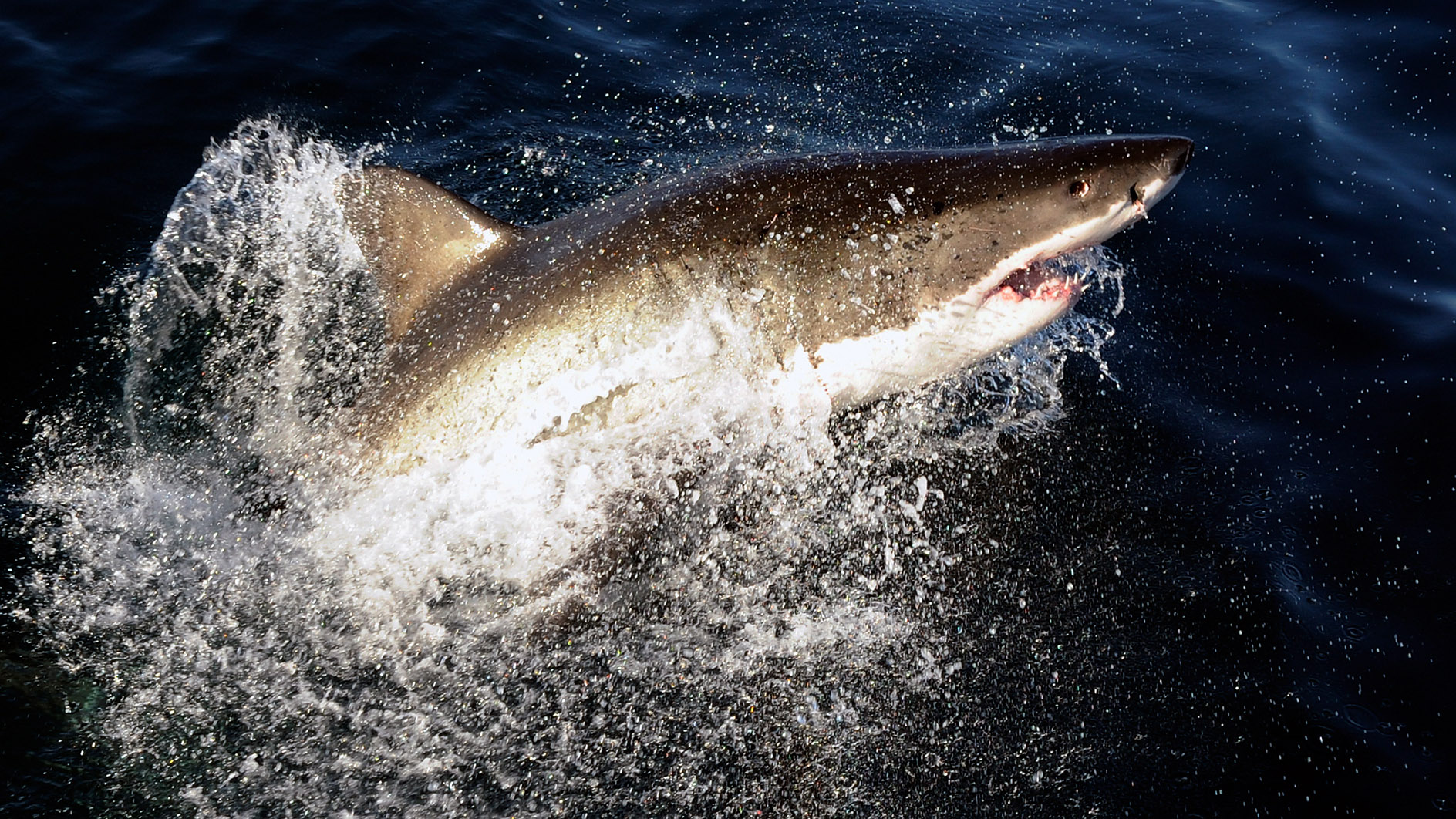
A great white shark (Carcharodon carcharias) jumps out of the water next to a boat in the Atlantic Ocean, Gansbaai, South Africa, 19 June 2010. (Photo: EPA / Francl Robichon)
Thankfully, researchers conclude, these findings confirm that the southern African population of this globally threatened shark species isn’t dying out. They’re simply fleeing the Cape and heading eastwards into safer waters.
Researchers have only recently come to know how wide-roaming these sharks are, and that individual animals trek easily between the Cape and the waters off Mozambique and Madagascar.
Now, with this new knowledge, conservationists draw attention to the importance of collaboration between conservation authorities in these neighbouring countries, where the management of marine protected areas that straddle national borders needs a completely fresh approach to that used for land-based ecosystems.
Whodunnit: The orcas
When marine biologist Dr Alison Kock was studying False Bay’s great whites for her doctoral research in the early 2010s, the bay was teeming with this formidable predator.
In the years between 2004 and 2012, about 720 individual white sharks were visiting the bay, according to Kock, and researchers would witness an average of 36 seal attacks in a morning.
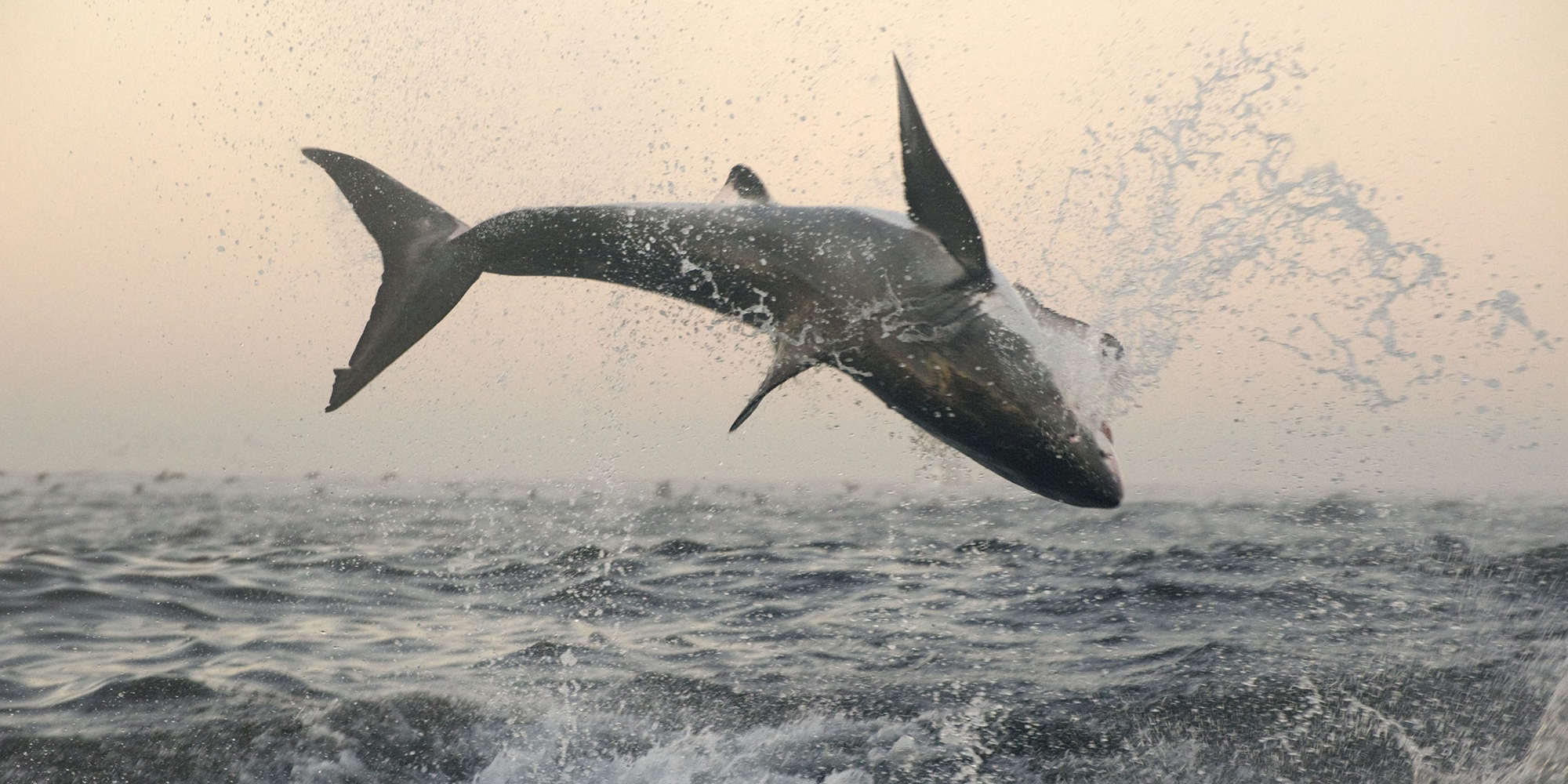
A 5m great white shark on the hunt in False Bay. (Photo: Gallo Images / Hotspot Media)
That changed with the arrival of Port and Starboard. Even though the pair were only visiting occasionally, white shark sightings dropped dramatically. Eight years later, the sharks still haven’t returned.
Read more in Daily Maverick: Where have all the Great White Sharks gone?
The hunting orcas also turned up in the waters at Gansbaai, about 80km east of False Bay as the crow flies, when shark cage-diving operators reported that shark sightings plummeted there too.
After the orcas’ arrival, several white shark carcasses washed up along the coastline near Mossel Bay, many with bite marks on their sides and missing their livers. Orcas are known to hunt sharks for these calorie-rich organs, leading to the theory that the sharks might be abandoning their popular West Coast sites to escape Port and Starboard.
Aerial video footage captured in 2022 showed the orca pair shark-hunting with a bigger pod near Mossel Bay.
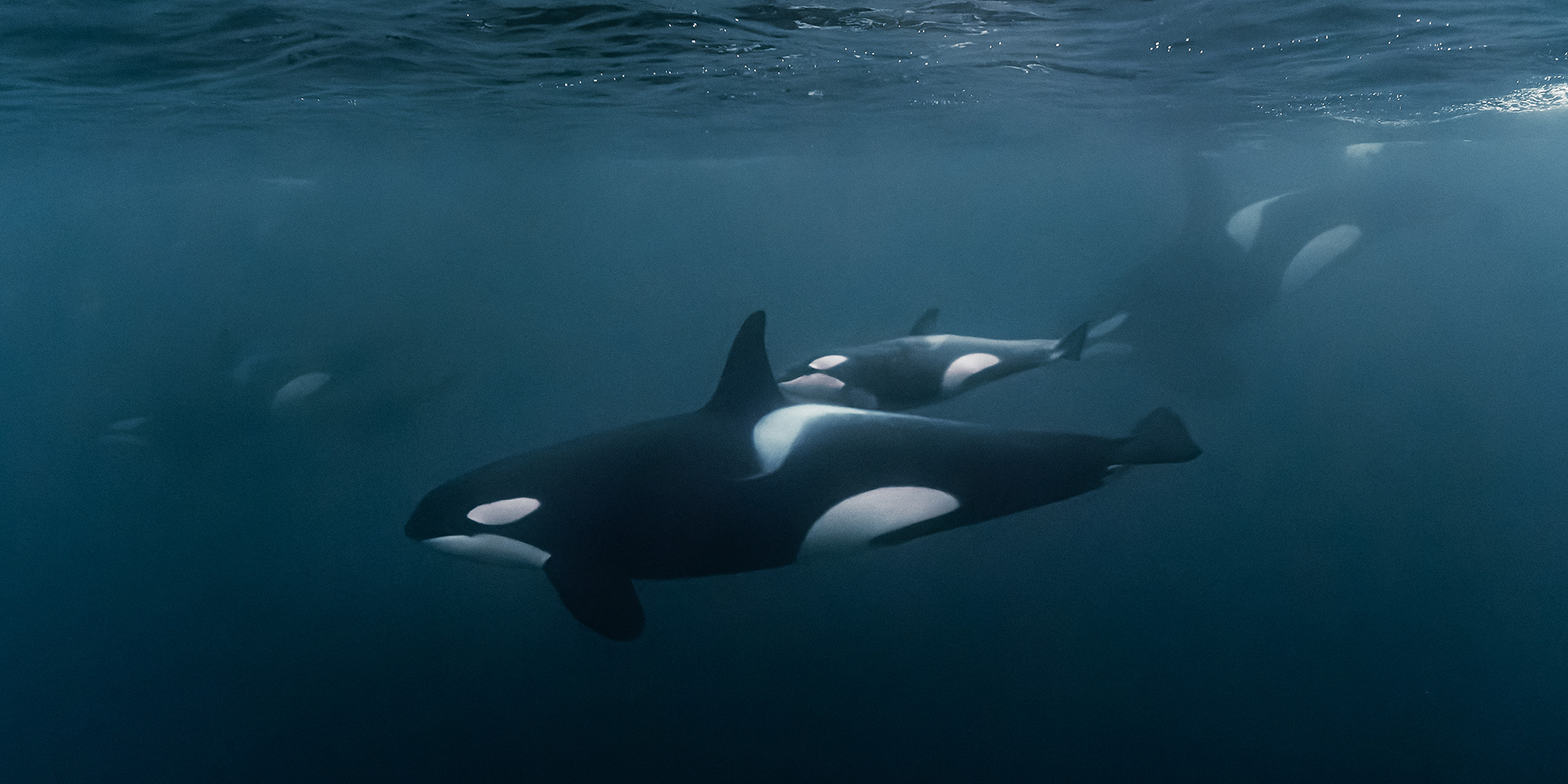
White shark sightings in False Bay dropped off dramatically with the arrival of two orcas. (Photo: iStock)
Shortly after the sharks disappeared from the Cape, white shark traffic increased at some of the known gathering spots further east, such as Mossel Bay.
Algoa Bay saw an eightfold increase in shark activity.
New shark arrivals at Plettenberg Bay were significant enough that the non-profit Shark Spotters expanded its observation posts beyond False Bay for the first time, opening one at this popular surfing spot to deal with the increased risk of human-shark interactions.
Dry data solves riveting mystery
“These major (changes) between different sites over five years is biologically impossible from a population point of view,” explains Kock.
Great whites can live to more than 70 years of age. Females only begin breeding at about 12, and have a litter of two to 10 pups every two to three years.
White sharks, listed by the IUCN as globally vulnerable, were given special protection in South African waters in 1991, so the disappearance of these animals from the western waters of their range caused concern.
To see what might be happening in the shark population over a longer timeframe, researchers from SANParks, Shark Spotters, the KwaZulu-Natal (KZN) Sharks Board and various universities teamed up to do some number-crunching.
They combined several years’ worth of sightings at shark hotspots — including False Bay, Gansbaai, Mossel Bay and Algoa Bay — with the numbers of great whites caught in shark nets and drum-lines off the KZN coast, along with figures from anglers’ catches.
They found that the shark population has remained mostly stable in the three decades since the species was given legal protection. These findings, published in the journal Ecological Indicators, confirm that the white shark population is moving eastwards within its usual roaming range, rather than dying out.
The finding doesn’t preclude other possible longer-term and wider ecosystem influences on shark movement, but it does explain the almost overnight disappearance of sharks from False Bay and Gansbaai and the increased activity further east, according to researchers.
Quest for elusive white shark decades ago raises questions about the species today
When sharks cross national borders
White sharks travel vast distances, and satellite tracking and genetic information confirm that the animals found in the waters from Cape Town to Mozambique and Madagascar make up a single population.
Tracking data also shows that individual animals can travel easily between the Cape and the warmer waters of Mozambique and Madagascar.
Great whites aren’t the only big fish making long-haul trips off the southern African coastline and crossing stretches of ocean that fall inside marine protected areas (MPAs) managed by different countries.
Dr Ryan Daly, with the non-profit Oceanographic Research Institute, led a recent study which tracked the movement of four other shark species between South Africa’s iSimangaliso Marine Protected Area and Mozambique’s Maputo National Park.
“This is one bio-geographic zone, with political boundaries separating it,” explains Daly. Together, these two administrative zones make up one of Africa’s largest transboundary MPAs.
Daly and team set up listening posts along the boundary between the two MPAs, and, using acoustic trackers attached to four shark species— bull sharks, blacktips, tigers and grey reef sharks — showed the extent to which these animals roamed between the two MPAs from 2018 to 2022.
“We tagged 102 individual sharks who crossed the border hundreds of times. Some (individual) sharks crossed the border on average 80 to 90 times a year over the four years. Animals spend a lot of time on both sides of (the boundary).”
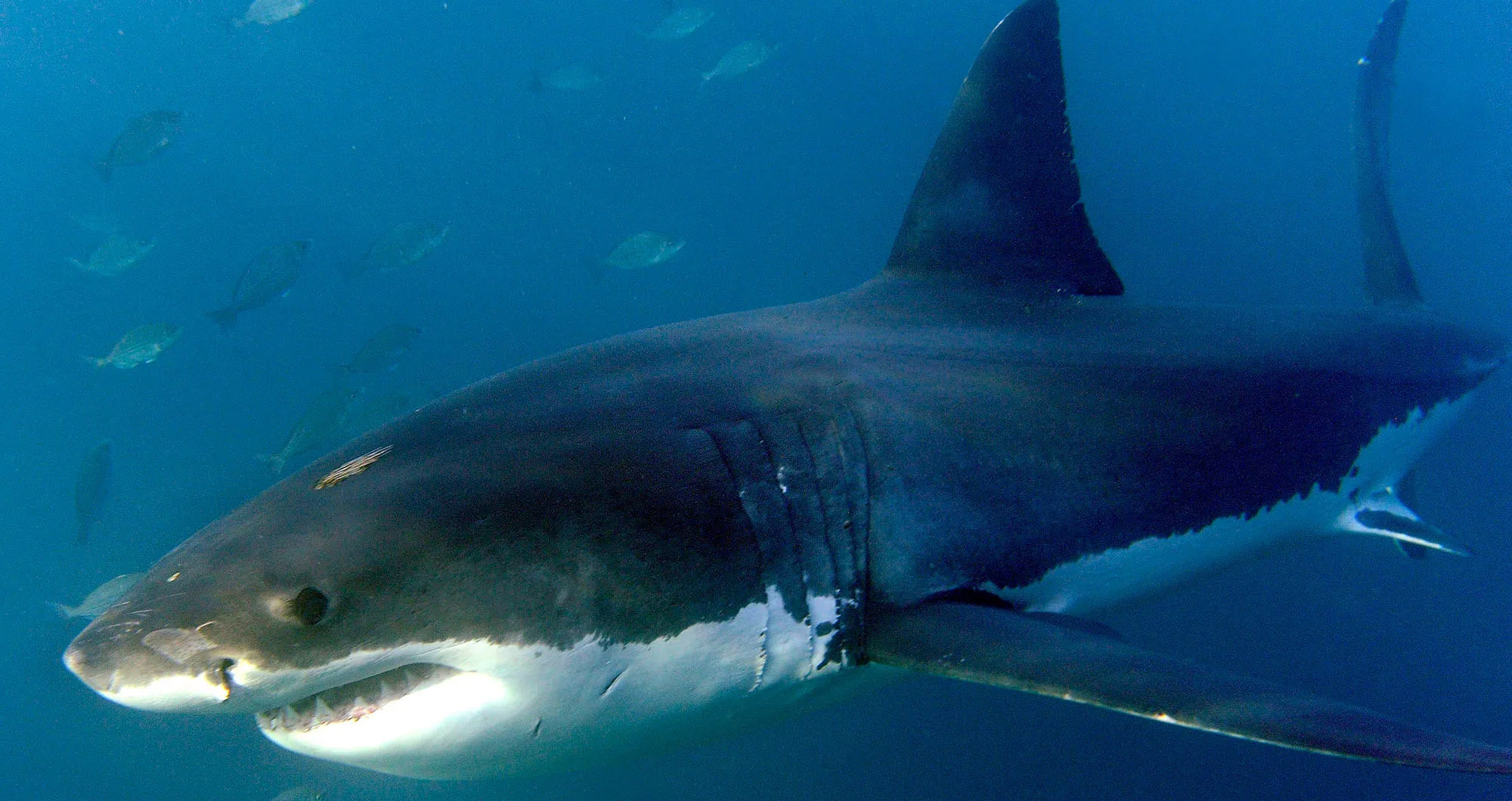
A great white shark in Gansbaai,. (Photo: EPA / Helmt Fohringer)
Many of these sharks’ conservation threat classifications have only been done in the past decade, says Daly, and there needs to be an information “catch-up” between how threatened they are, the scale of their movements and how connected their roaming areas are.
“We need to align conservation-driven objectives, and collaborate on massive conservation plans.”
Transfrontier protected areas are usually managed on the basis of terrestrial ecosystems, where fences stop animals from moving in and out of the administrative area.
“The ocean environment is different,” says Daly. “We need a paradigm shift in how we collaborate on transboundary (conservation) efforts.”
South Africa and Mozambique share the same animals (in the case of white sharks, that includes Madagascar), so these countries have to work collaboratively to improve their conservation status.
Marine researchers recommend that shark conservation management needs to take a region-wide view rather than focus on localised aggregation sites along the coast, and that neighbouring countries with this shared shark population should work together.
There also needs to be proactive management of shark-human interactions, such as the non-lethal methods used by Shark Spotters, as shark activity increases along South Africa’s east coast.
When the sharks fled False Bay, Shark Spotters’ project lead Sarah Waries hoped it would be a short-term blip, but the wary great whites are still steering clear even though the orca pair only visits occasionally.
Read more in Daily Maverick: Something big and scary has sent False Bay’s apex predators fleeing from the area
“We may go for months without seeing them,” says Waries, “and then we’ll see them twice in a month. One day they’ll appear in False Bay, the next in Mossel Bay, and then they’ll surface at Lüderitz (on the Namibian coast). They’re never around for long.”
Kock agrees. “It’s still unbelievable. I never would have thought, when I was doing my (PhD) work, that one day we wouldn’t have white sharks here.” DM




















Interesting, it confirms what’s long been suspected; the Orcas had something to do with this.
Thank you for a very informative article.
Hiram C Potts. The simultaneous arrival of two Orca’s (previously considered to be released from captivity, the bent dorsal fins are a symptom of only captive and captive bred Orcas), and the “disappearance” of Great white sharks from the Southern Cape waters beggars belief… These creatures have been cohabitating for millions of years. It’s like saying…a pair of muggers evicted an entire province after attacking a few people.
Gregory Dacombe. I think you underestimate the scale of the ocean in your analogy above. It is more like saying a pair of big, well armed troopers, with a taste for human flesh, raided a neighborhood and caused a few houses in the neighborhood to be abandoned.
The arrival of 2 Orcas, on a stretch of coastline, , may well cause their favorite snack to look for safer waters elsewhere.
Fascinating – thank you for this article. Really great
Facinating and very informative article. Thank you
Not sure how solid that paper is and whether the ‘migration’ is a fact. This is a comment from highly regarded shark marine biologist Enrico Gennari: “White sharks are down in False Bay, Gansbaai, Mossel Bay. Maybe there are three in Plettenberg Bay and a shark cage guy in Gqeberha tells me he just saw his first white shark in years. If all the sharks migrated up the coast you should have had a big uptick on the KZN net drumlines, but you haven’t. The paper’s nonsense, built around for fishermen illegally fishing for white sharks.”
The above quote came from an interview in which several people were involved. The last sentence (The paper’s nonsense, built around for fishermen illegally fishing for white sharks.”) did not come from Gennari.
…four fishermen
The Eve of Destruction is absolutely superb. Thanks so much for posting it. I have shared many times. Goose flesh supreme.